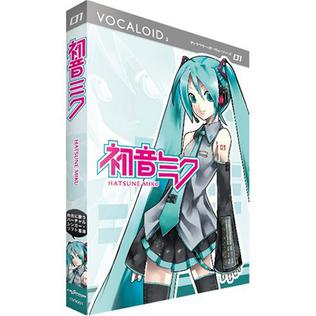Sorry for leaving you hanging for about 4 months. It seems like the only time I can focus on something is when I'm supposed to be doing something else. So, you can all thank my upcoming math final for this update :D
Since it's my first blog post after a very long absence, I thought I'd review something a little different: a song, or rather, a series of songs. I actually spent a lot of time exploring this story and facets of its creation, so this post isn't only about the songs, but the story, the creator, and the medium in which it was presented. And to top it all off, this is a really, really long blog post. But before you close your browser windows in disgust, please humor me for a few more paragraphs...
I first came across this seven-song story (try saying that three times fast) while I was
I actually spent a lot of time not only listening to the songs, looking up the author, researching what Vocaloid is, and basically getting carried away and trying to gain full understanding of a completely arbitrary subject. I know not everyone is not as
Vocaloid
Each of the songs was created using Vocaloid. For those of you who don't know, Vocaloid is a cool Japanese software thingy that you use to make music. Wikipedia calls it a "singing synthesizer", but basically you use the program to create the music and voice for a song. Each edition is based on a real-life person's voicebank, and they're all given a personality and "character". You may have heard of some of them, like Kagamine Rin and Len, or Hatsune Miku. There's actually a pretty big fanbase for these guys, including fanfiction stories even a couple spin-off manga. For more info, check out here or here.
Mothy
 |
| This is him. Doesn't he look creative? |
Story
This series is about the actions of a spoiled and prideful princess, whose selfishness brings down her kingdom and affects various people.
The events of the first song are as follows: While the kingdom is suffering a severe famine, the princess maintains a luxurious lifestyle by over-taxing her subjects. When confronted with the suffering of others, her indifferent remark is always "oh my, it's snack time". There is also a servant who "looks like the princess" and does whatever she commands. One day, the princess falls in love with a blue prince from across the sea, but he is in love with a girl with green hair in another kingdom. Enraged, she goes to war against the green kingdom, and causes destruction, as well as burdening her already starving populace with more expenses from the war. The blue prince and a woman in red finally rise up to lead a revolt against her, and the princess is sentenced death. As she stands at the execution block, the princess's last statement is, "oh my, it's snack time". And thus ends the reign of a cruel and callous "girl of evil".
To be honest, the first song wasn't all that meaningful to me. The spoiled princess got what's coming to her, right? Well, the story is told over 7 songs from 7 perspectives, and as you see how her actions have affected other people, you'll understand that the situation is complex. There really aren't any "bad" guys, just a lot of lonely and misguided people.
Recommendation
Not all the songs deal with the revolution and its aftermath: some of them develop character backgrounds or link Aku no Monogatari to other series. Since I'm not reviewing the merits of the plot, I don't actually recommend watching all the songs. For maximum emotional impact, I recommend Aku no Musume, Aku no Meshitsukai, Regret Message, Re:Birthday and Daughter of White -- in that order. I like that the themes of the story made me feel all introspective, the way all good art should, and I'm glad it made me cry. Everyone needs a good cleansing cry once in a while. It's cathartic, alright?
Since, unlike trying to get through the first boring volumes of a manga, watching the five songs will take less than 30 minutes, there's no reason you can't give it a try right away. Don't put it on your list, watch it today!
Afterword
I actually had a really hard time writing this review, because there was so much I wanted to say but not all of it was relevant. By the end, I wasn't sure if I was writing an promotional blurb for Vocaloid, a biography of Mothy, a summary of Aku no Monogatari, or a review about the music videos. I mean, how do you review the "emotional impact" of a story when you can't give away any plot twists? I know I spent way too much time on background info about Vocaloid and Mothy, so kudos to anyone who has read all the way to the bottom. Next time I'll do a nice, conventional review with a less convoluted subject. I hope you continue to follow me as I journey deeper into the internet otaku abyss!
Cheers,
- Unrepentant Otaku

No comments:
Post a Comment